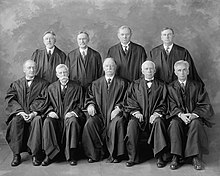George Sutherland
George Sutherland (born March 25, 1862 in Buckinghamshire , England , † July 18, 1942 in Stockbridge , Massachusetts ) was an American politician ( Republican Party ) and judge at the Supreme Court of the United States .
George Sutherland was an infant when his parents left England with him in 1863 for the United States. There they wanted to join the Mormon religious community . The family settled in Springville in what is now Utah , which was still a territory at the time .
1881 Sutherland graduated from the Brigham Young Academy , later he successfully studied law at the Law School of the University of Michigan , was admitted to the Bar Association of Utah in 1883 and began in Provo to practice. In court he made a name for himself as a representative of the interests of railway companies. From 1916 to 1917 he was the American Bar Association .
Sutherland ran for political office for the first time in 1890, but lost the election for Mayor of Provo. Two years later, his attempt to become a delegate of the Utah Territory in the US House of Representatives was also unsuccessful . He received his first mandate in 1897 as State Senator for Utah, which he remained until 1901, when he did move into the House of Representatives in Washington . He was a member of Congress during its 57th session until 1903 and did not run again. The following year he was first elected to the US Senate ; After a successful first re-election, he suffered a defeat in 1916 and left the Congress the following year.
Finally, in 1922, George Sutherland succeeded John Hessin Clarke as a judge at the US Supreme Court . He was one of four judges appointed during the Warren G. Harding presidency and was known for his conservative views. He was during the first years in office of US President Franklin D. Roosevelt as one of the Four Horsemen ( Four Horsemen called), which also James C. McReynolds , Pierce Butler and Willis Van Devanter included. These judges prevented numerous measures from Roosevelt's New Deal policy.
Sutherland stood up against McReynolds and Butler in one of the most important decisions of the court during his tenure. In the Powell v. Alabama case , the majority of judges he led ruled in 1932 that in the case of a capital crime, the defendant has the right to appropriate legal assistance. This was preceded by a trial for the rape of two white women against nine African-American youths in Alabama , eight of whom had been sentenced to death.
On January 17, 1938, George Sutherland resigned as a member of the Supreme Court. He died four years later.
Web links
- George Sutherland in the Biographical Directory of the United States Congress (English)
- Biography (English).
| personal data | |
|---|---|
| SURNAME | Sutherland, George |
| BRIEF DESCRIPTION | American (Republican) politician and judge |
| DATE OF BIRTH | March 25, 1862 |
| PLACE OF BIRTH | Buckinghamshire , England |
| DATE OF DEATH | July 18, 1942 |
| Place of death | Stockbridge , Massachusetts |



